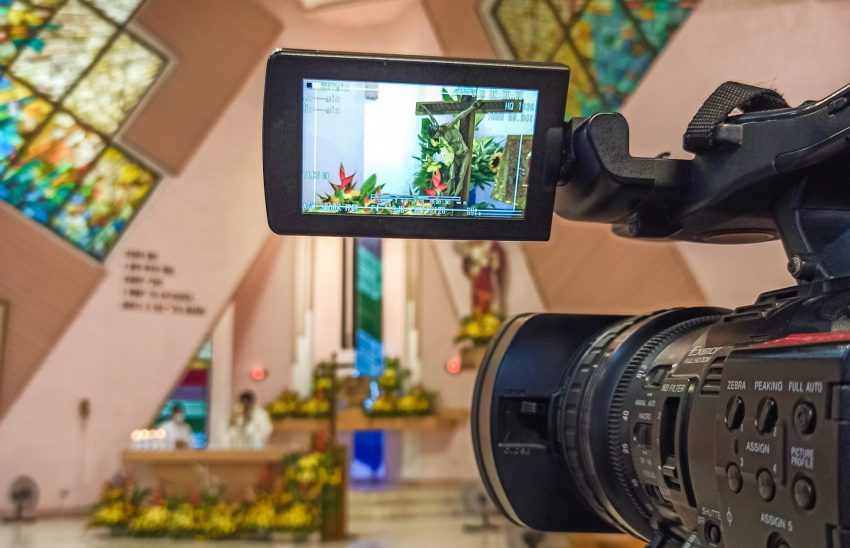I grew up amid the Great Worship Wars of the late 20th century, when the bravest pastors opened the chancel area to guitars and drum sets. Before long, projector screens and colored stage lights rushed in where angels feared to tread. Early adopters declared organ music, hymnals, and robed choirs to be the enemy. Resisters saw the new praise songs and blue-jean-wearing preachers (the audacity!) as a hostile invasion of their well-established holy ground. Traditional vs. Contemporary became a battle in congregations all across the land.
Those who lived through these times naively thought it would be the war to end all worship wars. And by the mid-2010s the matter was settled in most congregations, either by choosing one over the other or by offering multiple options for people to choose the style they preferred. Skirmishes continued to erupt in some places, but it became the exception rather than the norm. Peace began to reign. Little did we know, new battles were on the horizon.
A New War Emerges
About a decade ago, technological advancements gave rise to recording or livestreaming worship. The pandemic rapidly accelerated this trend, and by 2021 even most small, cash-strapped churches offered online worship. Sometimes using only a cell phone, pastors could now reach a whole new audience in real time.
Then, as in-person worship returned, many church leaders wondered if online worshipers would return or if they would they stay home, having grown accustomed to church on the couch. And if they stayed home, would that be acceptable? Is worshiping online the same as going in person?
Connection and community
Recent findings by the Pew Research Center indicate that the vast majority of Americans who worship in both ways—in person and online—say they prefer worshiping in person. By far the most common reason given was the sense of connection, fellowship, or community of in-person worship. Though virtual connection through a screen has revolutionized our work, families, and worship, we know that there is still value in gathering in person.
At the height of COVID-19, I missed out on dinners with friends, visiting my grandmother in Florida, and attending sporting events and theater performances. Fortunately, I was able to replicate much of this through a computer or TV screen. Yet as soon as it was safe to return to doing these things in person, I did so as quickly and fully as I could. Like many people, I had missed the connection that comes with being in the same room as another person, or seated among a crowd of people gathered to turn our attention toward something bigger than any one of us.
Why worshiping in person is important
In 2022, two months after leaving pulpit ministry to live out my vocational call in new ways, I moved to a new city. Having sold my car, I chose to worship with a congregation within walking distance of my apartment.
This new (to me) congregation warmly embraced me from the beginning. On the first Sunday, by the time I left the church building to return home, I had met four other first time worshippers, both pastors, and several church members.
I’m a fairly outgoing person, but I have never been able to connect with people in online spaces in the way in-person connections happen. And were it not for my commitment to worship in person nearly every Sunday, I surely would not have made friends in this congregation over the past year.
Declaring War?
I know of at least a few people experimenting with planting online only churches. I applaud the courage and innovative spirit of creating a virtual space, especially for people who struggle to connect with the churches in their own neighborhoods for a variety of reasons. I’m intrigued as this new form of ministry develops, though admittedly I struggle to imagine how foundational rituals of the church like baptism and communion can or will retain their meaning in such a setting.
Anytime I begin to pontificate about these and other merits of real, live, in-person worship, someone within earshot prepares for battle. “What about the sick and homebound,” they say, “Or those with limited mobility unable to enter our non-handicap-accessible sanctuaries? Did you ever think about how you’re excluding them?”
And this is true. In-person worship is not available to everyone or at every stage of life. Many have raised valid concerns that online worship is also a way of staying connected with young families who face challenges of nap times coinciding with worship times, Sunday sports and activities (or even full weekends away), and the controlled chaos of everyday life with kids.
Benefits of Online Worship
These are just some of the reasons why people watch religious services online. Participants in the Pew Research study also cited watching services that are held far away from where they live or services at places of worship they used to attend in person as reasons they worship virtually.
I have worshiped online when traveling for work or vacation. I have led baptisms, weddings, and funerals that were livestreamed for distant family members, an impossibility in my small church even eight years ago. As for the new church I began to attend? Thanks to the possibility of online worship, I was able to begin worshiping with the church more than a month prior to moving into the neighborhood!
Seeking the Truth—and a Truce
For these and other reasons, online worship is here to stay. It has connective and relational value, in addition to being accessible for those unable to attend in person. Churches should continue to nurture and invest in this new modality of religious services. It does not need to be an either/or debate. It can be both/and.
However, I do have one concern about the findings of the Pew Research study, which states that the most common reason given for attending worship online is “convenience.” But the call to discipleship is about how we fit into God’s plan, not how God fits into our busy lives. Taking the time to pray or read Scripture, putting our neighbor’s needs above our own, or giving away 10 percent or more of our income are seldom convenient. Yet we still do these things because we know they will help us grow in our relationships with our neighbors and with God.
Instead, I think of online worship in much the same way I used to approach delivering the sacrament of communion to the homebound. While it connected them with the gathered body of believers who shared the bread and cup in the sanctuary the previous Sunday, there remained a longing for and a grief over the loss of in-person connections. In much the same way, I am glad that online worship has created new paths of connectivity in the body of Christ. I only hope that those who choose to livestream worship do so out of necessity rather than mere convenience. After all, it is often the case that we don’t know what we’ve got ‘till it’s gone.
 The Rev. Erik Hoeke is a communications strategist at Pittsburgh Theological Seminary and an ordained elder in the United Methodist Church.
The Rev. Erik Hoeke is a communications strategist at Pittsburgh Theological Seminary and an ordained elder in the United Methodist Church.

